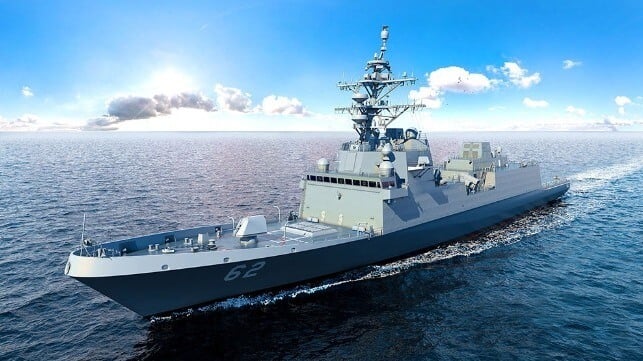U.S. Navy Cuts Constellation-Class Frigate, But Pledges Support for FMG
Shipbuilder Fincantieri Marine Group is expected to receive new government orders in exchange

The U.S. Navy has decided to terminate the last four ships of the Constellation-class frigate program, which has been delayed amidst reports of extensive Navy-instigated design changes. The decision is a major pivot away from past policy: as recently as last year, top officials had talked about doubling down by tapping a second shipyard to speed up Constellation-class construction.
In a video address posted to social media, Navy Secretary John Phelan - a longtime investment fund executive - said that he is "reshaping how the Navy builds and fields its fleet," and that the truncation of the frigate program is a first step in that direction.
"I will not spend a single taxpayer dollar unless it contributes directly to readiness and our ability to defeat future threats," he said. "The Navy and our industry partners have reached a comprehensive framework that terminates for the Navy's convenience, the last four ships of the class, which have not begun construction."
The construction of the first two ships is still going to continue, at least for now, and this will keep the yard fully online and its workforce employed - a critical consideration in defense shipbuilding. Shipbuilder Fincantieri Marine Group also has export work in the form of the LCS-based Multi-Mission Surface Combatant, a four-ship order for Saudi Arabia. No in-house job losses are expected.
"While some subcontracted labor will not be needed moving forward, we do not believe that this change will require layoffs," Fincantieri Marine Group told local media. "Although we wanted to build 10+ frigates, we know that we are a solid, competent shipbuilder and the Navy and our government needs that capacity."
Fincantieri emphasized that the Navy has committed to sending replacement orders its way, like "amphibious, icebreaking, and special missions" vessels. The Navy is also expected to look for opportunities for Fincantieri to build other small surface combatants, both manned and unmanned.
On top of the expectation of future orders, "the agreement indemnifies Fincantieri Marine Group on existing economic commitments and industrial impacts through measures provided by the U.S. Navy," FMG said in a statement.
The future of the first two Constellation hulls remains under review as the Navy works through its "strategic shift," Phelan said. The secretary said that dollars saved from the order reduction would be put right back into readiness, but did not immediately specify where the funding would go. The service has been soliciting input on advanced unmanned vessel options - including some designs that could fulfill some segments of a frigate role, like presence, ISR, ASW, or strike, enabled by containerized payloads with VLS cells for Standard-series and Tomahawk missiles.
Phelan implied that the long delays in Constellation's delivery timeline were a major factor in truncating the program. Due to deep revisions in the frigate's design, driven by Navy staff, the program was reportedly about three years behind schedule - too late for the Navy's 2027 deadline to prepare for a cross-strait invasion of Taiwan.
"A key factor in this decision is the need to grow the fleet faster to meet tomorrow's threats. This framework puts the Navy on a path to more rapidly construct new classes of ships and deliver the capability our war fighters need in greater numbers and on a more urgent timeline," Phelan said.
From day one I made it clear: I won’t spend a dollar if it doesn’t strengthen readiness or our ability to win.
— Secretary of the Navy John C. Phelan (@SECNAV) November 25, 2025
To keep that promise, we’re reshaping how we build and field the Fleet—working with industry to deliver warfighting advantage, beginning with a strategic shift away… pic.twitter.com/pbTpIPDfR8

that matters most
Get the latest maritime news delivered to your inbox daily.
Signs of trouble for Constellation have been building for some time. In May, the service removed Rear Adm. Kevin Smith, program executive officer for unmanned and small combatants (PEO USC), from his post as the top commander for frigate procurement. The Navy cited "a complaint substantiated by an Office of the Naval Inspector General investigation." Adm. Smith ran the Constellation-class frigate acquisition program from its early phases through 2023, when he took over as head of PEO USC.
In addition, earlier this year, the Navy left the procurement of future Constellation-class hulls out of its budget request for FY2026, leaving a gap in expected ordering activity.
